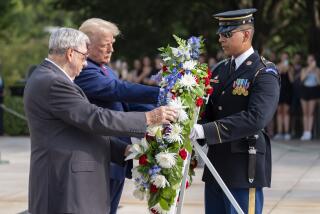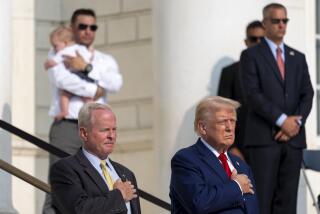Ex-Envoy to Be Removed From Grave at Arlington
- Share via
WASHINGTON — The remains of M. Larry Lawrence will be removed from Arlington National Cemetery, the White House confirmed Monday, amid a rising outcry over evidence that the late ambassador and friend of President Clinton’s had invented his story of heroic service in World War II.
Shelia D. Lawrence, Lawrence’s widow, released a letter saying that she has decided to bring his remains “home to San Diego” because the month-old controversy over his disputed burial “precludes his resting there in peace.”
While White House officials insisted the decision was hers alone, the move may cut short what threatened to become a lingering embarrassment to a president for whom military issues have always been a matter of special sensitivity.
Lawrence, a longtime Democratic donor and former owner of the Hotel del Coronado near San Diego, had won special permission to be buried in the military’s most hallowed burial ground because of a January 1996 official request. The request for a waiver stressed his supposed service, and injury, on a merchant marine ship that was torpedoed while ferrying emergency wartime supplies for the Russians.
The official request came from the State Department just after Lawrence died of a blood disease while serving as ambassador to Switzerland.
But as GOP lawmakers pointed out last week, searches of government archives turned up no documents substantiating Lawrence’s claim to service in the merchant marine.
And in the last several days, officials of Wilbur Wright Community College in Chicago said their records show he was enrolled there in March 1945 at the time he had claimed to have been serving on the Horace Bushnell, which was torpedoed by a German submarine in the Arctic Ocean while en route from Murmansk to Scotland.
In the last three days, demands were voiced that Lawrence be removed from a sought-after spot at Arlington, which because of tight rules declines burial requests from thousands of veterans. A forced disinterment, if it had come, would have been the first in the cemetery’s 135-year history.
Clinton, whose 1992 campaign received about $200,000 from Lawrence, sent a letter Monday to Shelia Lawrence praising her husband. Clinton said he would “always remember Larry for his friendship and for his service to his community and his country.”
He said Mrs. Lawrence’s letter brought him a “deep sense of personal sadness” and cited Lawrence’s “remarkable success as a businessman, his generosity as a philanthropist and his skill as a diplomat.”
A source close to Mrs. Lawrence said she was unable to reach any conclusions about the validity of the reports that seemed to undermine her husband’s claim to World War II service.
Mrs. Lawrence has been searching her own records to establish what happened during the war, but so far has found nothing to prove he had served as claimed. Now, her primary interest “is that these attacks should stop,” this source said.
In her letter, Shelia Lawrence said she remains “convinced that Larry’s wish to be buried at Arlington was justified by his courageous service as an American ambassador, even as he suffered from a most painful and ultimately fatal blood disease.”
Mrs. Lawrence, who had requested her husband’s burial at Arlington, added that “though there is much I do not understand about recent events, I and those who knew my husband remember a life that, although not perfect, was indelibly marked by kindness, compassion and his love for community and country. No chorus of critics, no matter how loud, will ever change that.”
Doubts about Lawrence’s burial had been gaining momentum in recent days.
Over the weekend, veterans, Republicans and even some Democrats began to say Lawrence should be moved if his story proved unfounded. Some contended that he if had dishonored the cemetery by fabricating the story, he should be moved, even if he might otherwise be entitled to special consideration because of his ambassadorial service, which began in 1995.
On Monday, the American Legion, which last week was neutral on the subject, announced that it would favor disinterment if the story was falsified.
“There are millions of honorably discharged vets who can’t get in,” said Phil Budahn, a spokesman for the American Legion. “They’ve done everything right, and it offends them that somebody should have lied about a war record.”
The issue had become “the major topic among vets,” Budahn said.
Jim Nicholson, chairman of the Republican National Committee, said in an interview Monday afternoon that if Lawrence had made up his story “he doesn’t deserve to lie near the Tomb of the Unknown Soldier, and near heroes who have won the Congressional Medal of Honor.”
In a press release later Monday, Nicholson said the “entire scandal would not have happened had it not been for Mr. Lawrence’s $10-million contribution to the Democratic Party and his close affiliation with the Clinton-Gore administration.”
And even George Stephanopoulos, Clinton’s 1992 political aide and first-term advisor, predicted on ABC’s “This Week” program Sunday that Clinton would put his foot down and order Lawrence’s remains moved if the military story proved false.
A prolonged investigation of Lawrence was likely to prove a liability for Clinton in any circumstances, and especially with the campaign donations controversy also hanging fire.
The announcement about Lawrence’s disinterment also may yet again shift the focus of a controversy that has changed directions repeatedly in recent weeks.
In mid-November, Republicans seemed to have found a political windfall in allegations from a conservative newspaper that the White House had “sold” burial spots to Democratic Party donors.
The White House appeared to snuff the controversy, however, with disclosure of details on the 69 persons who had won special permission for burial. Most of those 69 were relatives of fallen military personnel, or individuals with admirable resumes; in each case, except Lawrence’s, the decision to grant burial seemed above dispute.
But last week’s revelations about Lawrence seemed to make the White House victory short-lived. And with congressional and State Department investigations ahead, it looked like the unflattering disclosures could continue for weeks at least.
Lawrence, a tough businessman with many critics in San Diego--including Republicans--had narrowly squeaked by in late 1994 when his ambassadorial nomination was put forward by the White House. Critics contended he had no qualifications for the office and held up the nomination for months. Even then, Lawrence got only a tie vote in the Senate Foreign Relations Committee.
Critics, including at two trade associations representing career diplomats, noted that the Internal Revenue Service said that Lawrence owed $76 million in back taxes, and that he had been fined $7,100 by the Federal Elections Commission for exceeding campaign spending limits.
In addition, Lawrence had a personal life that would not reflect well on the president. Lawrence’s frictions with his former wives and children are widely known.
“This is not what they needed at the White House,” said one Democratic congressional aide.
On Friday, White House spokesman Mike McCurry acknowledged that Arlington is “a place of sacred honor to all Americans, and no one should be buried there who has falsified records.”
* AT CENTER OF DISPUTE: M. Larry Lawrence--controversial in life and death. A29
More to Read
Sign up for Essential California
The most important California stories and recommendations in your inbox every morning.
You may occasionally receive promotional content from the Los Angeles Times.











